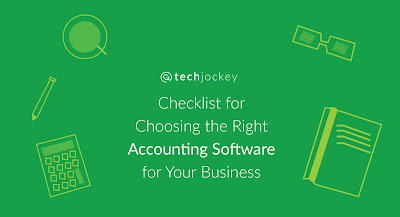
For maintaining the books of
business, earlier the records were kept in a paper ledger. With the growing
technology, businesses of all sizes have started using accounting software for
carrying out various functions like tracking their revenues, forecasting sales
and managing inventory. Accounting software for businesses helps them in
reducing human errors that occur in paper accounting. With plenty of accounting
packages available in the market, choosing the right one for you is really
confusing. To help you with the decision, we have listed down some important
points that you should consider to choose the right software.
Purpose
You need to consider your business
needs before choosing the software. Think about the problems you are facing in
your business and the aim of buying an accounting software. You need to
identify your business requirements and consider your business objectives too.
Essential
Features
Consider the features that different
accounting software offer and the one that fits the best for your business. Select
a software with features that can help you save your time with automation and
manage your accounting functions in a better way. Note down the essential
features required like invoicing, tracking expenses, creating POs, performing
bank reconciliation, managing stock, taxes and list of customers and vendors,
recording Journal Voucher entries, maintaining ledgers, viewing accounts
payable, accounts receivables, Balance Sheet, Profit & Loss A/c and Trial
Balance etc. Also consider the additional features available like
multi-currency support that can be an add-on to your business needs.
Budget
Limit
The most important consideration before
buying an accounting software should be your budget. Decide on your budget limit
and research on software available in the market to fit into your budget.
Customized/One-size-fits-all
If you have specific business
requirements you will have to get a customized software built. Off-the-shelf
software can also be bought, and required customizations too can be added in
it.
Accessibility
Your accounting information is very
important for your organization and it shouldn’t be accessible to everyone. Ensure
that there are security features and permissions for accessibility. Check
whether you can gain control over making authorization for changes in the data.
Cloud/Offline
Software
You will have to decide whether you
want to buy an online software or a desktop-based offline one. Most of the
businesses these days are adopting Cloud-based accounting software for their
convenience and benefit over traditional on-premise software.
Security Features
If you are considering buying an
online software, check for the data security. Find out how they store the
application data. Also try to find out the security measures they take and
where they host the application. It is also important to check if these
services are using HTTPS connection.
Scalability
Before selecting an accounting
software consider your business plans of expansion. Your accounting software
should allow you scalability and flexibility to help you grow and add more
number of users cost-effectively.
Prioritize your need analysis and
ensure that the software you are buying meets most of them, if not all, through
its features.
Finding the perfect accounting
software for your business is not an easy task. Once you invest your money into
it, it will be difficult to migrate to another later. You definitely wouldn’t want
to buy one application and after investing time into it, decide to switch to
another one just a few months later. So before deciding on buying an accounting
software it is always good to consider the above mentioned points and spend
more time in evaluating the software. There can’t be best business accounting
software, but there can be one that is best for your business!
Source : Techjockey
Very nice blog on Accounting Software. I think it really works for me. Thanks for discussing it.
ReplyDeleteOnline inventory management